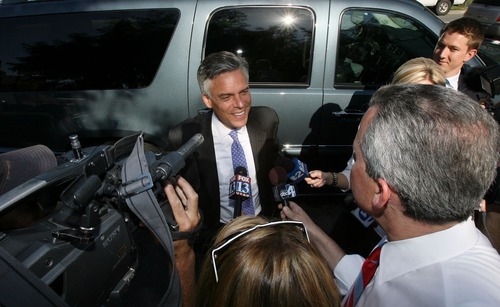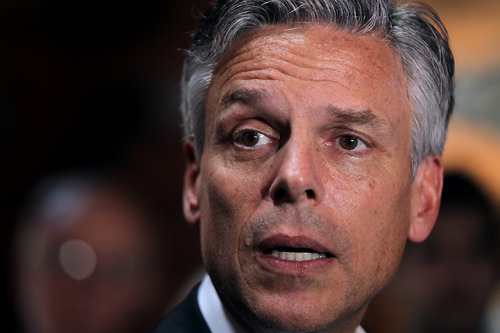This is an archived article that was published on sltrib.com in 2011, and information in the article may be outdated. It is provided only for personal research purposes and may not be reprinted.
In a race where he has been labeled the moderate, Jon Huntsman is taking a decidedly conservative approach on one hot-button issue: abortion.
Already on record as an abortion foe, the former Utah governor favors amending the U.S. Constitution to overturn the Supreme Court's decision in Roe v. Wade and outlaw abortion.
"Governor Huntsman supports a federal amendment that would ensure legal protections for the unborn," said Huntsman spokesman Tim Miller. "He's proud of his record in Utah and will continue to advocate for life on a national level."
Karrie Galloway, executive director of Planned Parenthood of Utah, said Huntsman's support for a constitutional amendment appears to be a shift to the right for him.
"He seems to be bending toward a very conservative agenda," Galloway said. "That certainly makes him much more strident than he was as governor of Utah. He didn't make that any part of his platform [then]. I'm disappointed that he is bowing to the extreme conservative politics."
Clyde Wilcox, a political science professor at Georgetown University who has written extensively about abortion in politics, said abortion is a big issue for an activist base that is important in places like Iowa.
But it is less important in New Hampshire — where Huntsman is focusing his efforts — and it matters even less in a general election.
"His position in the primaries is going to look very centrist — it's not going to look very much different than Newt Gingrich or Mitt Romney. The problem is, as the candidates push themselves further to the right, they have a harder time coming back to a remotely salable position in the general election," Wilcox said.
"Huntsman is giving himself a reasonable strategic position, which is to say, I think he could defend that position in a general election," he said.
Huntsman is not as devout as some in the field. During the recent Iowa debate, former Pennsylvania Sen. Rick Santorum defended his belief that abortions should also be prohibited in cases of rape, incest or to protect the life or health of the mother. Huntsman supports such exceptions.
Texas Gov. Rick Perry expressed support for a constitutional amendment on abortion in an interview this month with the Christian Broadcasting Network.
Huntsman and Mitt Romney have also refused to sign a pledge from the Susan B. Anthony List that demands that they will only appoint pro-life Cabinet members, prevent taxpayer dollars going to abortion and support legislation prohibiting abortion after 21 weeks.
The Republican Party Platform has, for years, called for an amendment to prohibit abortion, but, Wilcox said, constitutional amendments are remarkably rare. Indeed, there have been calls for an amendment outlawing abortion for decades.
"Basically, it's a painless position for Republicans, because it should happen, but the president doesn't do anything about it," Wilcox said.
Speaking to conservative groups, Huntsman has highlighted his pro-life position to solidify his bona fides among a presidential field packed with anti-abortion conservatives.
To drive home the point, he tells the story of his adopted daughter, Gracie Mei Huntsman, who was abandoned in a vegetable market in China and adopted by the family.
"There is something more essential than politics, especially a child's life," Huntsman told a group of conservatives at the Faith and Freedom Conference in June. "As governor of Utah I supported and signed every pro-life bill that came to my desk."
His assertion is true. Utah has some of the nation's most restrictive abortion laws, and several of them were passed and signed during Huntsman's tenure as governor.
The extent to which Huntsman was a driving force behind those bills, however, is subject to debate.
Gayle Ruzicka, president of the Utah Eagle Forum, said Huntsman signed the abortion bills that landed on his desk, but that is what governors in a conservative state like Utah are expected do.
"Whatever was passed he signed. He didn't veto them or work against them. I would have been shocked if he'd done that," she said. "But it wasn't something he talked a lot about. He wasn't a leader in pro-life legislation, but he signed them and that was important."
Galloway agrees with Ruzicka's assessment.
"He wasn't a governor who was pushing, cheerleading those who were opposed to reproductive rights," Galloway said. "He wasn't a governor that spearheaded either an anti-choice or reproductive rights agenda."
Huntsman signed bills that banned second-trimester abortions; required women to be notified that a fetus can feel pain before receiving an abortion; required parental permission before teens could get an abortion; and would ban all abortions in Utah should the Supreme Court overturn Roe v. Wade.
Rep. Paul Ray, R-Clearfield, sponsored the fetal pain bill and the legislation banning abortion if the courts upheld a South Dakota law challenging the legality of Roe. Ray, who is a Huntsman supporter, said the governor was nothing but supportive of his efforts.
Ray said the governor wasn't publicly outspoken, but he and staffers would check in and make sure the bills were on track and asked if they needed a push and has no reason to doubt Huntsman's pro-life position.
"I heard a rumor that he threatened to veto a bunch of stuff like that, but there was never any mention of a veto. It was full support by the governor," he said.
Utah Rep. Carl Wimmer, R-Herriman, who has sponsored several abortion bills over the years, said he had his disagreements with Huntsman on other issues, but never on abortion.
"On this particular issue, Governor Huntsman was always supportive of our efforts to restrict abortion," Wimmer said. "It's the one area that the governor and I were really walking in lockstep together on. I've never seen him try to block a bill or change a bill. He always seemed very supportive."
gehrke@sltrib.comTwitter: @RobertGehrke







